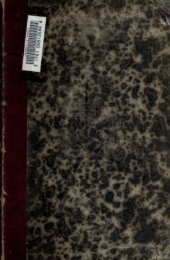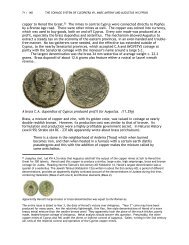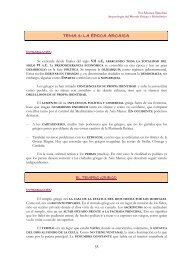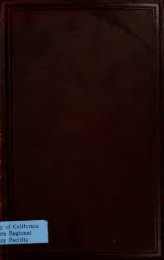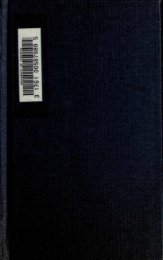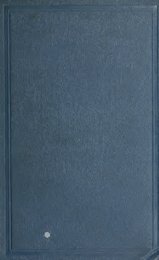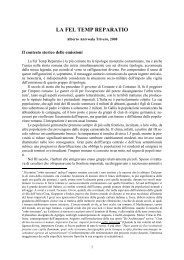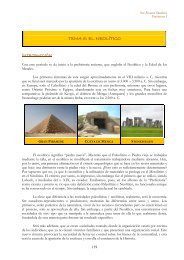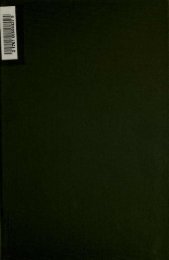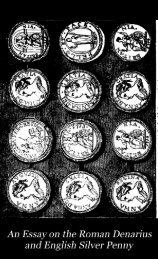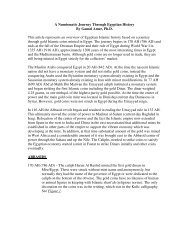- Page 7:
7-^7 NUMISMATA HELLENIC! : CATALOGU
- Page 10 and 11:
LOKDOM : C3 317 GILBKBT AND EIVINGT
- Page 13 and 14:
PREFACE. The geographical knowledge
- Page 15 and 16:
PREFACE. vn object has been to make
- Page 17 and 18:
I Metal Size Weight in graius Troy.
- Page 19 and 20:
f Metal M ¥ M M M M M M Size 3+ +-
- Page 21 and 22:
Metal Size Weight N N M M M M JR JR
- Page 23 and 24:
Metal N N N N N N N N N N M M M M M
- Page 25 and 26:
Metal M M M M M M M M M M M M M M M
- Page 27 and 28:
Metal KINGS OF MACEDONIA.
- Page 29 and 30:
Metal Size Weight M M JE JE N M M M
- Page 31 and 32:
Metal Size Weight M M 4 m JE JE M J
- Page 33 and 34:
Metal Size Weight M M M M M JE H 5+
- Page 35 and 36:
I Metal Size Weight N M 4-3 N M M M
- Page 37 and 38:
Metal Size Weight .-R KINGS OF MACE
- Page 39 and 40:
Metal Size Weiglit M JE M H 6- 4 M
- Page 41 and 42:
Metal Size Weight M M JR M M M KING
- Page 43 and 44:
Metal M Size Weight 8 262-0 JR o^ M
- Page 45 and 46:
Metal KINGS OF SYRIA. 27
- Page 47 and 48:
Metnl Size Weight M M M M M M M M J
- Page 49 and 50:
Hetal Size Weight M M M M JR M JE M
- Page 51:
Metal M M M Size 4 Weight M 257-5 K
- Page 54 and 55:
36 KINGS OF SYRIA. Metal M M M JE J
- Page 56 and 57:
38 KINGS OF COMMAGENE. Metal Size 5
- Page 58 and 59:
40 KINGS OF EDESSA. Metal M JE M M
- Page 60 and 61:
42 KINGS OF BITHYNIA. Metal M JE JE
- Page 62 and 63:
44 KING OF GALATIA. Metal Size Weig
- Page 64 and 65:
46 KINGS OF CAPPADOCIA. Metal M M M
- Page 66 and 67:
*8 Metal Size Weight M 56-1 JE n JE
- Page 68 and 69:
50 Metal Size M JE iE Electnim Poti
- Page 70 and 71:
52 Metal Size A' M M M M M M M 3-2
- Page 72 and 73:
54 KINGS OF BACTRIA, &;c. Metal M M
- Page 74 and 75:
56 KINGS OF BACTRIA, &c. Metal M Si
- Page 76 and 77:
58 KINGS OF EGYFr. Metal Size Weigh
- Page 78 and 79:
60 KINGS OF EGYPT. Metal M
- Page 80 and 81:
62 KINGS OF EGYPT. Nfetiil M Size 5
- Page 82 and 83:
Metal M N M M M M M N M Size 7i 7+
- Page 84 and 85:
66 Metal Size Weight M M M M 1 + 25
- Page 86 and 87:
'age CORRIGENDA TO KINGS AND DYNAST
- Page 89 and 90:
I Metal M M M M M Size 4+ 4 U 3-2 9
- Page 91 and 92:
Metal Size Weight M ASIATIC GREECE.
- Page 93 and 94:
M M M JE M Size Si 4i Weight M 9 +
- Page 95 and 96:
Metal JE M JE M JE JE M £ JE M JE
- Page 97 and 98:
I Metal M JE M M M M M M M M Size W
- Page 99 and 100:
Metal M JE M JE JE JE M M JE M Size
- Page 101 and 102:
Metal Size Weight M JE M JE JE 65-5
- Page 103 and 104:
Metal M M JE M JE M M M M M M M Siz
- Page 105 and 106:
Metal M ^ M M M JE M M M ASIATIC GR
- Page 107 and 108:
Metal iE M M M M M M M Size 4i 8 5
- Page 109 and 110:
Metal ASIATIC GREECE. 2]
- Page 111 and 112:
Metal M JE Br. M jE Size *2 ASIATIC
- Page 113 and 114:
Metal JE JE M JE M M M JE M JE Size
- Page 115 and 116:
Metal ASIATIC GREECE. 27
- Page 117 and 118:
Metal M M M M M JE M JE ASIATIC GRE
- Page 119 and 120:
Metal M JE M JE JE JE JE Size 7i 54
- Page 121 and 122:
iMetal JE M JE M M M JE JE M JE JE
- Page 123 and 124:
Metal I M Size 4 JE m M M 6 6i Weig
- Page 125 and 126:
Metal M M M M J& M M M M. M Size 4
- Page 127 and 128:
Metal ASIATIC GREECE. 39
- Page 129 and 130:
Metal M JE M JE M m JE M JE Size We
- Page 131 and 132:
Metal ASIATIC GREECE. 43
- Page 133 and 134:
Metal JE. M M JE M M M M Size 4 4 3
- Page 135 and 136:
I Metal M M JE M M M M 6 6 Size Wei
- Page 137 and 138:
Metal M M M M M M m Size Si H 6+ H
- Page 139 and 140:
Metal Size Weight M M M M N JE M H
- Page 141 and 142:
Metal M M M Size 7 Weight ASIATIC G
- Page 143 and 144:
Metal Size Wvight M JR JR M M M M M
- Page 145 and 146:
Metal M M M JE M M M JE Size Weight
- Page 147 and 148:
Metal ASIATIC GREECE.
- Page 149 and 150:
Metal M M 2 M M M M JE Size 6-5 4 3
- Page 151 and 152:
Metal Size M M M M M MM M 6 2i 3 1
- Page 153 and 154:
Metal M M M M IE IE M JE M Size Wei
- Page 155 and 156:
Metal M m & M M M Size 5-4 M 7-6 M
- Page 157 and 158:
Metal I M M M Size iE 8-6 Weight AS
- Page 159 and 160:
Metal M M M M M M M M Size 4 6-5 3
- Page 161 and 162:
Metal M M M M M M M M M M size 2- 3
- Page 163 and 164:
Metal ASIATIC GREECE. 75
- Page 165 and 166:
MeUl Size Weight JE M JE M M M M M
- Page 167 and 168:
Metal M M M M M M M M M Size Weight
- Page 169 and 170:
Metal ASIATIC GREECE. 81
- Page 171 and 172:
Metal Size Weight JE M El. M JR M J
- Page 173 and 174:
Metalj Size IE M M M M M JR. M 10-9
- Page 175 and 176:
Metal Size Weight M JE M JE M M JE
- Page 177 and 178:
Metal M iE M M M /E JE M M M Size 5
- Page 179 and 180:
Metal M M Size 9 M 6 .E •'2 M M 4
- Page 181 and 182:
Metal Size M ASIATIC GREECE. 93
- Page 183 and 184:
Metal M M ' Size Weight 4-3 4 2^ jR
- Page 185 and 186:
Metal M JE ASIATIC GREECE. 97
- Page 187 and 188:
Melal Size Weight M JE JE M M M M J
- Page 189 and 190:
Metal JE M M JE M JE JR JE M JE M S
- Page 191 and 192:
Metal Size 6 6 M 6 M M M M 4+ Weigh
- Page 193 and 194:
IMetal I JE M M M M JE M M Size 7i
- Page 195 and 196:
Metal El. ASIATIC GREECE. 107
- Page 197 and 198:
Metal Size Weight M M M M M M M n 8
- Page 199 and 200:
Metal Size I Weight AS. M M M M 4+
- Page 201 and 202:
Metal Size Weight JE M M M M M 8+ 7
- Page 203 and 204:
Metal Size M JE M M JE JE M M JE M
- Page 205 and 206:
Metal El. N Al JE M M /E JE M M ^ M
- Page 207 and 208:
Metol Size Weight M M M M JE JE M A
- Page 209 and 210:
Metal M M M JE M ^ M JE M Size 4 5
- Page 211 and 212:
Metal M M M M M M M M M M Size Weig
- Page 213 and 214:
1 Metal Size JE M M 4i 6+ 6- M 6+ M
- Page 215 and 216:
Metal Size Weight M 168-3 M M M M M
- Page 217 and 218:
Metal JE JE JR H ^ M 10- JE JE M M
- Page 219 and 220:
Metal Size Weight JE JE M JE JE JE
- Page 221 and 222:
Metal Size M ASIATIC GREECE. 133
- Page 223 and 224:
Metal JE .E M M M JE M M JE M Size
- Page 225 and 226:
Metal 1 M JE JE JE M JE JE Size 7-6
- Page 227 and 228:
I Metal M IE JE M M M Size 6 5 8-7
- Page 229 and 230:
Metal Size Weight M M JE JE 5i ' 2
- Page 231 and 232:
Metal ASIATIC GREECE. 143
- Page 233 and 234:
Metal I M M M M M JR M Size 11 4-3
- Page 235 and 236:
Metali Size i Weight .E M iE M M iE
- Page 237 and 238:
;Metal ^M M Size 10 5-4 5-4 6+ 2+ W
- Page 239 and 240:
Metal M M M M M M M M Size Hi 02 4i
- Page 241 and 242:
Metal Size Weight M M M M M M M M M
- Page 243:
Metal Size Weight iE M, 4+ H Page A
- Page 247 and 248:
Metal Size Weight M M M JR M M M JE
- Page 249 and 250:
Metal EUROPEAN GREECE.
- Page 251 and 252:
Metal M M JR M M M M JE M M M M M S
- Page 253 and 254:
Metal M M M M M M M JE M M M Size H
- Page 255 and 256:
Metal M Size *2 M M JR M M M M M M
- Page 257 and 258:
Metal i JE M JE M M M JE M M M M Si
- Page 259 and 260:
Metal M IE M Size EUROPEAN GREECE.
- Page 261 and 262:
Metal Size M M M M JR M M M JR M JR
- Page 263 and 264:
Metal EUROPEAN GREECE. 17
- Page 265 and 266:
Metal Size Weight M M M JR M M M M
- Page 267 and 268:
Metal Size Weight EUROPEAN GREECE.
- Page 269 and 270:
Metal Size Weight M M o 6+ .8-6 M 7
- Page 271 and 272:
Metal JR JR M M MM M M JR M Size I
- Page 273 and 274:
Metal M JE M JE JE JE JE M JE JE M
- Page 275 and 276:
Metal EUROPEAN GREECE. 29
- Page 277 and 278:
Metal M /E M /E M M M M JE M Size 5
- Page 279 and 280:
Metal M EUROPEAN GREECE. S3
- Page 281 and 282:
! 1 Metol EUROPEAN GREECE. 55
- Page 283 and 284:
Metal M M JR M M M M M M M M M M M
- Page 285 and 286:
Metal M M M M EUROPEAN GREECE. S9
- Page 287 and 288:
Metal EUROPEAN GREECE. 41
- Page 289 and 290:
Metal Size Weight JE JE M M JE .E H
- Page 291 and 292:
Metal M M M M M JE Size 2 1 + 1- 4+
- Page 293 and 294:
Metal M M M M M M M M M M M JR Size
- Page 295 and 296:
Metal EUROPEAN GREECE. 49
- Page 297 and 298:
:Metal Size *2 3 8-6 Weight 154-5 E
- Page 299 and 300:
Metal Size /E JE M sE JE JE JE M JE
- Page 301 and 302:
Metal M EUROPEAN GREECE. 55
- Page 303 and 304:
Metal EUROPEAN GREECE. 57
- Page 305 and 306:
Mrtal M M M M M M M JR M JP. M M M
- Page 307 and 308:
Metal Size Weight JR M Al JR M JR J
- Page 309 and 310:
M EUROPEAN GREECE. 63
- Page 311 and 312:
Metal M M JR M M M M JR M M JR M JE
- Page 313 and 314:
Metal Size I JE 7 M EUROPEAN GREECE
- Page 315 and 316:
Metal Size 2i 2+ 2+ 4 4 ^2 6i Weigh
- Page 317 and 318:
Metal M JE M JE M M. M M Size 6 3-
- Page 319 and 320:
Metal Size JR M JE JE M ^ M JE M 7-
- Page 321 and 322:
Metal M Size 5-4 5 M 2 JE M JE JE J
- Page 323 and 324:
Metal EUROPEAN GREECE. 77
- Page 325 and 326:
Metal Size Weight M M M M M M M M m
- Page 327 and 328:
Metal M JE M JE M M M M JR M M JE J
- Page 329 and 330:
Metal EUROPEAN GREECE, 83
- Page 331 and 332:
Metal Size Weight M M JE M JE M M M
- Page 333 and 334:
Metal EUROPEAN GREECE. 87
- Page 335 and 336:
Metal M M M M M M JR. M M M M Size
- Page 337 and 338:
Metal N M M M /E JE M M M Siie 4 3
- Page 339 and 340:
Metal M JR M M M M MMM M M M M JR.
- Page 341 and 342:
Metal Size Weight M M M M M JR. M 2
- Page 343 and 344:
Metal EUROPEAN GREECE. 97
- Page 345 and 346:
M i Metal Size 51 M 5 M M M M M M M
- Page 347 and 348:
Metal M Size Si M Weight EUROPEAN G
- Page 349 and 350:
Metal M EUROPEAN GREECE. 103
- Page 351 and 352:
M Size 2i 9-7 8i-7 .5 + Weight EURO
- Page 353 and 354:
Metal EUROPEAN GREECE. 107
- Page 355 and 356:
I Metal Size M U JR JE M Weight H H
- Page 357 and 358:
MeUll M M Size n M 4^ M M 5-3 4 Wei
- Page 359 and 360:
Metal Size Weight M M M M M 6- 4i 4
- Page 361 and 362:
Uetal ITALY. 115
- Page 363 and 364:
Metal Size M M M 5 4i *2 M 5+ Weigh
- Page 365 and 366:
Metal M M M M M M M JR M M JR M M S
- Page 367 and 368:
Metal ITALY. 121
- Page 369 and 370:
Metal ITALY. 123
- Page 371 and 372:
Metal Size Weight M M M M M M M i 4
- Page 373 and 374:
Metal Size Weight M M M M M M M M M
- Page 375 and 376:
Metal M JR M JR M I ' M JB. M M M M
- Page 377 and 378:
Metal ITALY. ]S1
- Page 379 and 380:
Metal; Size Weight M M JE. JE JE H
- Page 381 and 382:
Metal I ! M Size 3 M M M M JR M M M
- Page 383 and 384:
jMetal i M M M M M M JR. M M JE M M
- Page 385 and 386:
Metiil ITALY. 139
- Page 387 and 388:
Metal Size Weight N A' N M M M M M
- Page 389 and 390:
Metal JE M JE JE JE JE JE JE JR I S
- Page 391 and 392:
Metal M M M M M N N N N M Size H 2+
- Page 393 and 394:
Metal : M M M M M JR M M JR M M M M
- Page 395 and 396:
Metal JR M JR JR M MMMMMM JR M JR J
- Page 397 and 398:
Metali Size M M M M H 05 4.1 5- Wei
- Page 399 and 400:
Metal ITALY. 153
- Page 401 and 402:
Metal ITALY. 155
- Page 403 and 404:
Metol M M ^ M M M M Size 2 3 2i Wei
- Page 405 and 406:
Metal M M M JR M M M M Size 6- S 7-
- Page 407 and 408:
Metal M M M M Size EUROPEAN GREECE.
- Page 409 and 410:
Metal Size Weight JR M M M M M 4+ 3
- Page 411 and 412:
Metal M EUROPEAN GREECE. 165
- Page 413 and 414:
Metal M M Size 5-4 4-3 4+ INSULAR G
- Page 415 and 416:
Metal Size Weight JE M M M M M M JR
- Page 417 and 418:
Metal Size Weight M 2 JE M M M M M
- Page 419 and 420:
Metall Size M 4 M M 3 3 3 3i 3i 3i
- Page 421 and 422:
Metal ^GiEAN SEA.
- Page 423 and 424:
Metal ^GiEAN SEA. II
- Page 425 and 426:
Metal /GG^AN SEA. 13
- Page 427 and 428:
Metal Size Weight M M M M M 7-6 H 1
- Page 429 and 430:
Metal ^GiEAN SEA. 17
- Page 431 and 432:
Metal Size Weight M M M M M M M 5+
- Page 433 and 434:
M I Metal j Size 2+ iE 3- Weight M
- Page 435 and 436:
Metal M M JR JR M JE M M JE JE M JE
- Page 438 and 439:
26 Metal M El El El M M JR M Potin
- Page 440 and 441:
28 Metal Size Weight M M M M M M 4-
- Page 442 and 443:
so INSULAR GREECE. Metal Size Weigh
- Page 444 and 445:
32 INSULAR GREECE. Metal Size Weigh
- Page 446 and 447:
S4 Metal M Size 6 M 4- M 2i Weight
- Page 448 and 449:
36 Metal INSULAR GREECE.
- Page 450 and 451:
38 Metal M M M M M M MM M M M M MMM
- Page 452 and 453:
40 Metal M M M M M M M M M M M M Si
- Page 454 and 455:
42 Metal M JE JE Size 3+ 3 Weight M
- Page 456 and 457:
44 Metal Size Weight JE M JE M M M
- Page 458 and 459:
46 Metal Size Weight M M M M M M 2+
- Page 460 and 461: Metal Size M M M 2+ H N n Weight in
- Page 462 and 463: 50 M JR M M Metal JR M M M JE JE M
- Page 464 and 465: 52 Metal Size Weight M JE M JE M 5-
- Page 466 and 467: 54 Metal M M MM M M MM M M M M M M
- Page 468 and 469: 56 Metal M Size 2- M M M M M 3i 3i
- Page 470 and 471: 58 Metal JR /R M M M M JE M Size n
- Page 472 and 473: 60 INSULAR GREECE. Metal Size Weigh
- Page 474 and 475: 62 Metal Size JE M M M JE M M M M 3
- Page 476 and 477: fi4 Metal Size Weight M MM JE JE M
- Page 478 and 479: 66 Metal Size Weight El. INSULAR GR
- Page 480 and 481: 68 Metal Size Weight M M M M M M M
- Page 482 and 483: 70 Metal Size Weight N 5 4i 3J2i 2+
- Page 484 and 485: 72 Metal M M M M Al M M Size 6* 61
- Page 486 and 487: 74 Metal M JR M M JR M M M M M M M
- Page 488 and 489: 76 Metal I JE JE JE M M M /E M JE M
- Page 490 and 491: 78 Metal INSULAR GREECE.
- Page 492 and 493: 80 Metal M M El. M JE M M M M JE M
- Page 495 and 496: Metal Size M M AFRICAN GREECE. CYRE
- Page 497: Metal JR M M M M Size H 3+ 8- 6+ 6+
- Page 501 and 502: INDEX. KINGS AND DYNASTS. PAGE Abga
- Page 503 and 504: Csesareia Cappadocise . As. CITIES.
- Page 507: APPENDIX TO NUMISMATA HELLENICA, CO
- Page 512 and 513: 4] NOTE ON THE WEIGHTS OF GREEK COI
- Page 514 and 515: 6] Csena . Calacte Camarina . Catan
- Page 516 and 517: 8] BOSPORUS CIMMERIUS. GEOGRAPHICAL
- Page 518 and 519: 10] Antiochus I. (So- ter) . II. (T
- Page 520 and 521: INDEX TO THE NOTES. The Numbers ref
- Page 522 and 523: 14] Boeotiae (monetary), Eu. 100: o
- Page 524 and 525: 16] pollonia (Lyciae), description
- Page 526 and 527: 18] monarchy under Diodotus about 2
- Page 528 and 529: 20] thus successively their chief t
- Page 530 and 531: 22] Damastium (lUyrici) probably a
- Page 532 and 533: 24] Euergetes, epithet of Antiochus
- Page 534 and 535: 26] Homer figured on coins of Colop
- Page 536 and 537: 28] wards by Pleminius, the lieuten
- Page 538 and 539: 80] earlier dynasts ; preserves its
- Page 540 and 541: 32] League, Eu. 4 : made a Roman co
- Page 542 and 543: 34] ruler of Argissa, Gyrtone, Orth
- Page 544 and 545: 36] coins of Tarsus and of some of
- Page 546 and 547: 381 hostile alliance headed by Crot
- Page 548 and 549: 40] U. Urof the sacred writings (no
- Page 550 and 551: LONDON : GILBEBT AND RIVINOTON, PRI
- Page 552 and 553: iv PREFACE. to that of the capture
- Page 555: CONTENTS. KiKGS 1— 9 Asia ^ 10—
- Page 558 and 559: Metal M Size 10- M M M M M M M JE N
- Page 560 and 561:
4 KINGS. Metal M M M N M N M M M. M
- Page 562 and 563:
Metal Size M JE M M M M M M 4+ 7-6
- Page 564 and 565:
Metal Size Weight M M M M M M M H 9
- Page 566 and 567:
Metal M M M M M M M Size 5i 2+ 7+ H
- Page 568 and 569:
12 Metal Size Weight M 9i JE Sh M 3
- Page 570 and 571:
14 Metal ASIA.
- Page 572 and 573:
16 ASIA. Metal M M M Size Weight 8-
- Page 574 and 575:
18 Metal Size Weight M H M JE M 9 9
- Page 576 and 577:
20 Metol Size Weight M M 2- 1 + 4-
- Page 578 and 579:
22 Metal Size Weight M M M 9-8 6 6
- Page 580 and 581:
24 Metal M Size 6 M M 5- 5 5+ 7-6 M
- Page 582 and 583:
26 Metal M JE M M M Size 3- 4+ 1 4+
- Page 584 and 585:
28 Metal Size Weight M 3i JE JE 9+
- Page 586 and 587:
30 Metal Size Weight M M H M JE M M
- Page 588 and 589:
32 Metal JE JE M M M M JE JE JE JE
- Page 590 and 591:
34 Metal Size I Weight ASIA. Rome t
- Page 592 and 593:
36 ASIA. Metal Size Weight iE 8+ JR
- Page 594 and 595:
38 Metal Size Weight M 6+ M M M JE
- Page 596 and 597:
40 Metal M M M M MM M M JS. Size 3
- Page 598 and 599:
42 Metal Size M M M M M M JE M M M
- Page 600 and 601:
44 Metal Size | M M El. El. El. M M
- Page 602 and 603:
46 Metal JE JE M M M M M 4+ Size We
- Page 604 and 605:
48 Metal Size M JE M JE JE JE M JE
- Page 606 and 607:
50 MeUl M M M M M M M M M M Size We
- Page 608 and 609:
52 Metal M M JE M M M M M M M /E M
- Page 610 and 611:
54 Metal M ^ M M M JE Size Weigh; 1
- Page 612 and 613:
56 Metal Size Weight M M JE M 5+ 6-
- Page 614 and 615:
5S Metal ASU.
- Page 616 and 617:
60 ASIA. M Metal Size M M M M M M J
- Page 618 and 619:
62 Metal Size Weight M M M M IS. Z\
- Page 620 and 621:
(i4 Metal Size Weight M JE 10 M M 7
- Page 622 and 623:
66 Metal Size I Weight M M M M M M
- Page 624 and 625:
68 Metal Size Weight M JE JE M JE J
- Page 626 and 627:
70 Metal ASIA.
- Page 628 and 629:
72 Metal Size Weight M 7-6 M M .*;
- Page 630 and 631:
74 Metal M M M M M JE M JE M Size W
- Page 632 and 633:
76 Metal Size M 3 M M /R M JE 1 4+
- Page 634 and 635:
78 ASIA. lelal
- Page 636 and 637:
80 Metal M Size \ M 3 M M M M Weigh
- Page 638 and 639:
82 ! Metal Size Weight M M M M M M
- Page 640 and 641:
84 ASIA. Metal i M M Size 1 4i M Q\
- Page 642 and 643:
sc ASIA, Metal Size M JE M 3-2 5 5-
- Page 644 and 645:
88 Molal Size Weight M M JR M M a:.
- Page 646 and 647:
90 Metal M Size 5 + JE JE M JE iE M
- Page 648 and 649:
92 Metal Size Weiglit M JE M JE M M
- Page 650 and 651:
94 ASIA. Metal Size ; M M M M M M M
- Page 652 and 653:
96 Meta' Size Weight M M M M M M M
- Page 654 and 655:
98 Metal Size Weight M M M M JR M M
- Page 656 and 657:
100 Metal ASIA.
- Page 658 and 659:
102 Metal M JR JE /E JE Size 2i
- Page 660 and 661:
104 Metal Size Weight M M M JE M 4+
- Page 662 and 663:
106 ASIA. Metal M M M M JE JE M M m
- Page 664 and 665:
108 Metal Size Weight JE JE 3 ^ M J
- Page 666 and 667:
Metal M M M iE M M Size Weight in g
- Page 668 and 669:
112 Metal M Size 8+ M M M M M M M M
- Page 670 and 671:
114 EUROPE. Metal
- Page 672 and 673:
Metal EUROPE.
- Page 674 and 675:
118 EUROPE. Metal Size M M M M M M
- Page 676 and 677:
120 Metal M M M M M M M M Size 7 6+
- Page 678 and 679:
122 MeUl M ^ M M M MM M MMMM JR M M
- Page 680 and 681:
124 Metal M JE JE M M JE M Size 3+
- Page 682 and 683:
126 Metal Size Weight M M M M U 4+
- Page 684 and 685:
128 Meta j Al M M M M M M M M M M M
- Page 686 and 687:
130 Metal M M M M M MM Size I 5 3 2
- Page 688 and 689:
132
- Page 690 and 691:
134 MeUl Size Weight M 5i iE M M JR
- Page 692 and 693:
136 EUROPE. Metal M JE M ^ JR. M M
- Page 694 and 695:
138 Metal M M M M M M M Size 3+ 4-3
- Page 696 and 697:
140 Metal M JE M M JE Size 3 4 X3 3
- Page 698 and 699:
142 EUROPE. Metal M M M M 10 JE M S
- Page 700 and 701:
144 Metal M M M JE Size 5 + 6-5 Ji\
- Page 702 and 703:
146 Metal M M M M M M M M M M S!ze
- Page 704 and 705:
148 M M Metal Size Weight j& M M M
- Page 706 and 707:
150 EUROPE. Metal
- Page 708 and 709:
Metal Size M M M M M M M 5+ 3 7-2}
- Page 710 and 711:
154 Metal M M M
- Page 712 and 713:
166 Metal Size Weight M M 3- '2- El
- Page 714 and 715:
158 ISLANDS. Metal M M M M
- Page 716 and 717:
160 Metal Size Weight M M M M M M M
- Page 718 and 719:
162 ISLANDS. Metal Size Weight M 8-
- Page 720 and 721:
164 ISLANDS. Metal
- Page 722 and 723:
166 Metal Size M JE M M M M M M M N
- Page 724 and 725:
168 > Metal Size I Weight M M M M M
- Page 726 and 727:
170 Metal ISLANDS.
- Page 728 and 729:
172 Metal ISLANDS.
- Page 730 and 731:
174 ISLANDS. Metal Size Weight M M
- Page 732 and 733:
Metal JR M M M M Size 8- 2i 3+ M 10
- Page 734 and 735:
178 ADDENDA. Metal M M M Size Weigh
- Page 736 and 737:
180 INDEX. ApoUonia Mysise Mygdonia
- Page 738 and 739:
182 INDEX. Thalassa Cretse . Thasus
- Page 740 and 741:
184 INDEX TO THE NOTES. Aureliopoli
- Page 742 and 743:
186 INDEX TO THE NOTES. use in the
- Page 744 and 745:
188 Philalethes, a magistrate of La
- Page 746:
LONDON : OILUKRT AND RIVINOTO.V, PR



